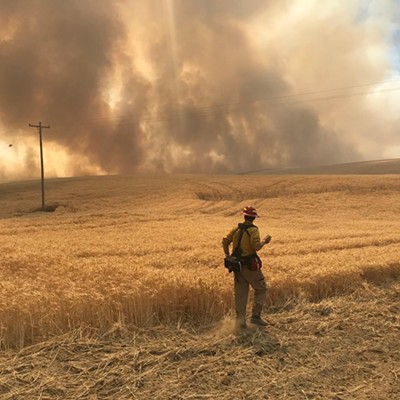Despite their reputation for being tough guys, the men and women who are first on the scene at emergencies sometimes need a little help, too. That's why the Bend City Council recently unanimously authorized a five-year agreement with psychologist Dr. Andrew Barram to provide educational tools and mental health support services for both the Bend Police and Fire departments.
The new service will give first responders the option to consult with Dr. Barram—available in-house—who will coordinate finding appropriate outside mental health services. Dr. Barram will not be providing treatment.
While outside mental health care has always been available to first responders, both departments want to ensure that their employees are healthy by having access to the tools necessary for handling and dealing with the stress and traumatic situations they experience every day.
Bend Police Chief Jim Porter says the departments were looking for a mental healthcare professional first responders would be comfortable with.
"We're seeing an accumulation of stress as first responders have to deal with mental health calls and people who have taken their lives," he says. "It's having an effect on our officers, so we are exploring how we can better serve them."
Bend Fire Battalion Chief Administrator Dave Howe says offering first responders more mental health care options has been in the works for a while—especially after attending two talks by Dr. Kevin Gilmartin, a behavioral scientist who has experience with law enforcement. Gilmartin has been "studying the effects of [people who work in] intense professions throughout their whole careers and he's given a few talks in Bend," Howe explains, "and he got us thinking about how we can do a better job of balancing our lives."
Chief Porter has worked in law enforcement since 1983 and over the course of his career, he says, "it's always been a challenge for officers to maintain the resilience they need to come to work every day." He adds, "We know we send the men and women into horrific situations and situations that you only see on television—they're out picking up a body that's three weeks old—and as leaders they deserve the very best we can give them."
Porter says because there is some stigma associated with seeking mental health help, they kept that in mind when they began drafting a plan.
"We believe that by having someone imbedded with them," he explains, "they will help him or her before they reach a crucial point—where they need acute services."
Howe also agrees that providing first responders with additional resources will allow them to be a healthier, happier group of people.
"Fire and police both—we see an awful lot of stuff that most people don't see...a lot of sad situations," he says. "[Dr. Barram] is really going to help us all develop some strategies and intergrade them in healthy way. He hasn't met everyone one yet, but he's an open-minded guy and he'll be able to help." Howe believes that balancing life both at and outside of work is a vital part of maintaining a healthy staff.
While first responders witness tragedies, they also know that they, too, are putting their lives at risk. Porter says the department can lose tens of thousands of dollars if a mid-to-upper-level officer is lost, so investing more in mental health is necessary.
"We owe that to them," he says, "as the people who run towards the sound of bullets, to be able to give them that support."
Howe says the Fire Department has a physical fitness program and combining it with mental health wellness will be a great conduit for their employees.
"The whole first responders' universe is starting to realize there's more to this job than kicking in a door and bringing a hose in or arresting someone," he says. "Dealing with traumatic incidents on a career-long basis—that accumulation of things—we need to learn how to put them in place."
Investing in mental health for first responders doubles as an investment in the community, according to Howe.
"I'm hoping that Dr. Barrum will really work on building a higher level of trust with us and the community," he says. "When the community can see that we're mentally fit, we're going to have a better collaboration between all the fist responders and our community; [they] support us with funds and with trust, and we do our job with the best intentions."
Dr. Barram is still in the process of meeting first responders, but Porter and Howe believe he's the right person for the job.
"He has a ton of experience working towards mental fitness and a lot of experience with emergency mental health," says Howe.


























